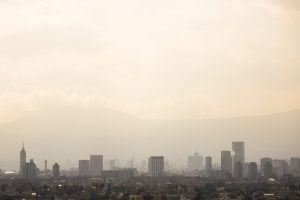This piece was first published in El Universal
Times of great turmoil sometimes bring the opportunity for great progress. As leaders around the world work to protect the sick and vulnerable from COVID-19, while also moving to restart their economies, they have a chance to rebuild better — creating a world that’s cleaner and healthier than before. This means investing in an economy that creates more jobs and less pollution, including less of the air pollution that causes diseases that put people at higher risk for severe illness from COVID-19.
It should be a world with fewer deaths from heart and lung disease triggered by air pollution, a world with a safer and more stable climate for our children and grandchildren. This is the kind of world we can create if we heed the lessons of this terrible pandemic.
As the Mexican economy has stalled and the tourism industry shuttered, we have been experiencing less transport pollution than we can remember, but for a reason no one would ever want. It’s a hint of what could be if the energy that powers our lives is cleaner. It means speeding the transition to less-polluting, more efficient energy sources. It also means addressing methane emissions from the oil and gas supply chain. Here in Mexico we have a remarkable opportunity to do just that.
Mexico can rebuild a cleaner, stronger energy economy post COVID-19 Share on XMexico’s own national emissions inventory reports that oil and gas accounted for an estimated 760,000 metric tons of methane pollution in 2015. And though carbon dioxide gets most of the climate headlines, methane is far more powerful — more than 80 times more potent at trapping heat over the first 20 years after it is emitted. At a least one-quarter of the planetary warming we experience today is caused by man-made methane emissions.
Methane gas leaks are also terribly wasteful. Wasting 760,000 tons of methane (the main ingredient in natural gas) through leaks is the same as annually wasting 2.5 billion pesos (US $120M) in natural gas sales. Capturing this otherwise wasted product could generate revenue for the country, where revenue from the state-owned petroleum industry directly feeds the national treasury. In other words, reducing methane is not just good for the environment, it’s good for the economy too.
In fact, reducing oil and gas methane emissions is the fastest, cheapest way to slow global warming right now. Making use of existing, low cost solutions all along the full global supply chain, the International Energy Agency says it is feasible to cut these emissions in almost half — at no net cost to operators. For Mexico, this means there is a significant opportunity to improve national security while better protecting the environment and public health.
Like the coronavirus, climate pollutants such as methane are invisible to the human eye, but their abundance in our atmosphere threatens millions of people worldwide. Record-setting temperature rise is driving a wave of increasingly destructive hurricanes and heat spells across Mexico, and extreme heat makes respiratory diseases like asthma much worse. Both scientists and citizens are able to connect these extreme events to a warming earth.
The climate effects of methane pollution are well known. But what is not as clearly emphasized are the health risks. Oil and gas operations are a leading source of smog-forming volatile organic compounds. High smog levels can harm everyone, and children — who often spend more time outdoors and are more likely to have asthma — are particularly at risk from these effects. Seniors, people with lung disease and people who are active outdoors also have increased risk from smog pollution. These are the underlying medical conditions that put people at greater risk of serious illness from COVID-19.
During oil and gas production activities, methane is released with other toxic chemicals that impact health — toluene, xylene and benzene are just a few. Formaldehyde, another toxic air pollutant, is also often released from the exhaust of natural gas compressor engines. In addition, flaring of natural gas is a large source of black carbon particles with large health impacts and a large global warming potential.
Elevated levels of benzene and formaldehyde have been detected near oil and gas production sites. People exposed to these toxic air pollutants can have an increased chance of cancer or other serious health impacts, including damage to the immune system, and neurological, reproductive, developmental, respiratory and other health problems.
Fortunately, there is a way to combat these methane-induced climate and health concerns.
Under the leadership of ASEA, Mexico’s oil and gas regulator, the country enacted strong methane regulations in 2018. Implementation is now key to deliver on the societal, economic and environmental benefits of methane reductions. These rules give Mexico a unique opportunity to create jobs in clean technology and energy efficiency and maximize the value of its natural resources to achieve domestic prosperity.
Crises can teach us valuable lessons. But they can also remind us of things we’ve been missing — like the importance of protecting public health while improving the environment and making our society and economy stronger and more equitable. Let’s ensure that the worst of times bring out the best in us, so that we look back on this crisis as the moment we began making the changes that improved our lives, secured our children’s future and preserved the health of our people and planet.










